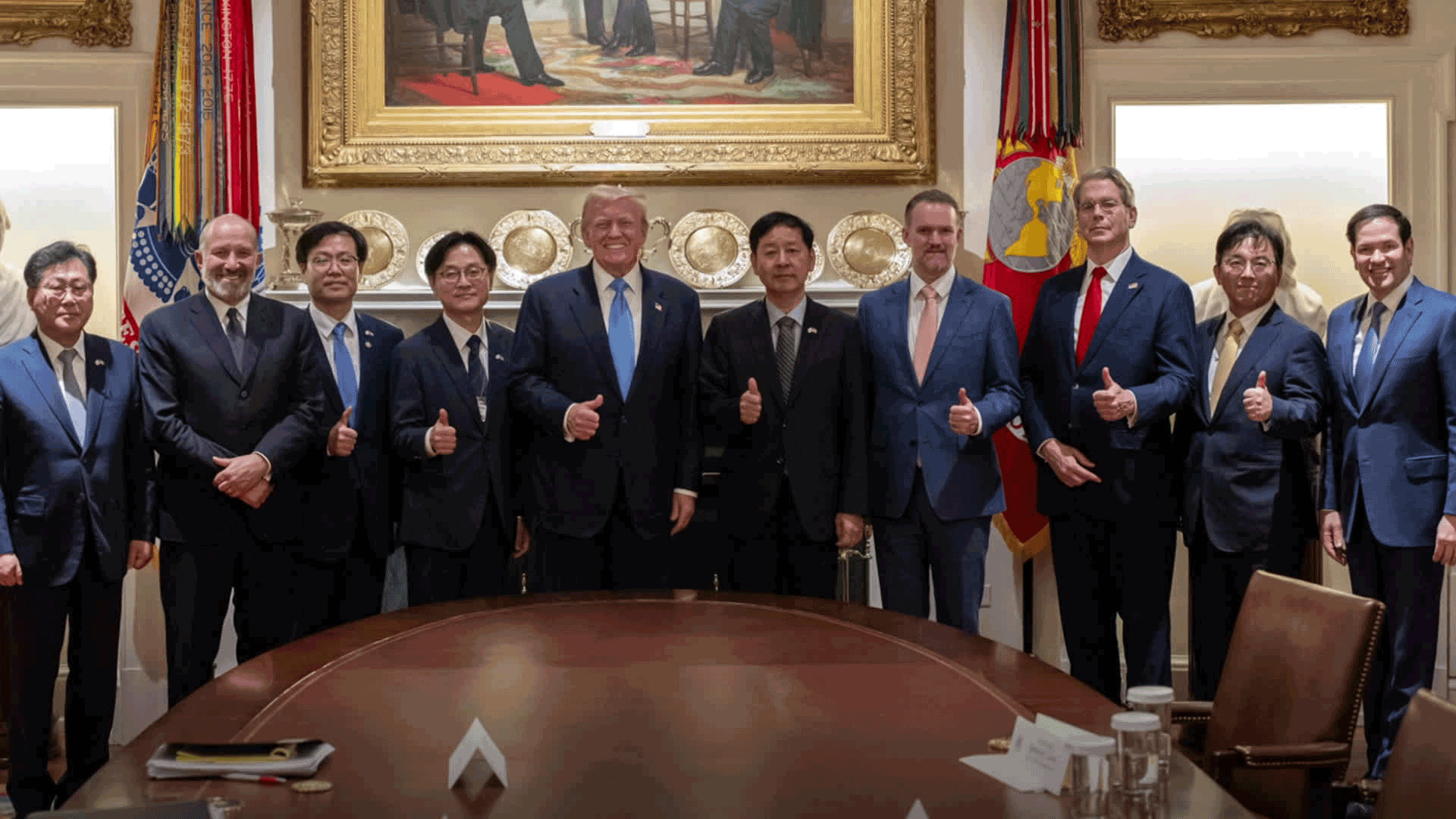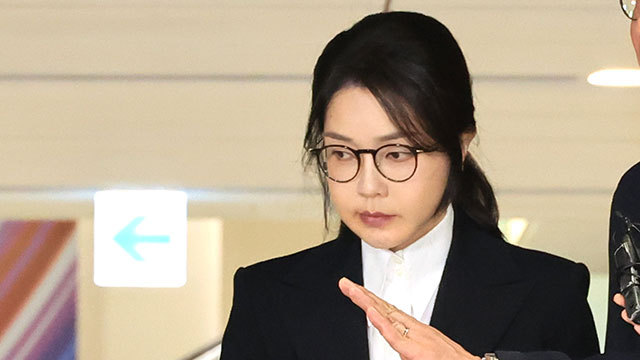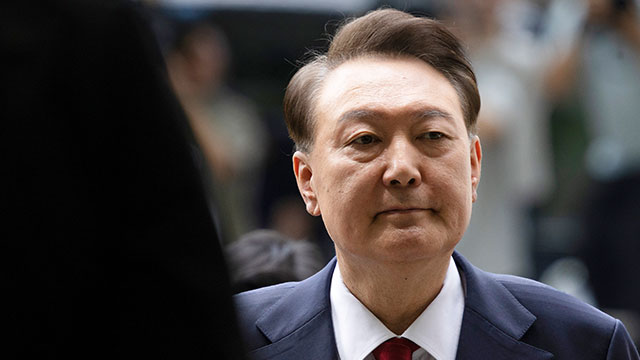[Anchor]
The Korean government’s tariff negotiation team briefed the National Assembly today (8.6) on the progress of recent talks.
They acknowledged that pressure from the U.S. to lower non-tariff barriers—such as quarantine measures and digital regulations—would likely continue, and they signaled a willingness to partially accept U.S. demands.
Reporter Park Kyung-joon has more.
[Report]
The negotiation team explained the growing concerns over easing quarantine restrictions on U.S. agricultural imports and other non-tariff barriers.
[Kim Jung-kwan/Minister of Trade, Industry and Energy: “We promised to strengthen cooperation on the import hygiene procedures for U.S. fruits and vegetables and to accept U.S. automobile safety standards.”]
Opposition lawmakers pointed out that the Ministry of Agriculture had designated a new official specifically for approving U.S. agricultural imports—arguing that this would essentially lead to more imports.
[Kang Seung-kyoo/People Power Party lawmaker: “You say you're negotiating, yet the presidential office declares there will be ‘no additional opening of the agricultural market.’ What are the people supposed to believe?”]
The government rebutted, saying the quarantine framework itself remains unchanged.
[Kim Jung-kwan/Minister of Trade, Industry and Energy: “The U.S. feels the quarantine process takes too long and is overly complex, so we’re looking to strengthen cooperation in that regard.”]
On regulations concerning major online platform operators, the government said it would continue talks to ensure the pending Online Platform Act doesn’t disadvantage the U.S.
[Song Jae-bong/Democratic Party lawmaker: “I hope we don’t just blindly accept U.S. demands.”]
[Kim Jung-kwan/Minister of Trade, Industry and Energy: “The core idea is to ask for equal treatment. We’re thoroughly communicating with the U.S. to prevent any misunderstandings.”]
The negotiation team also clarified that the Korea-U.S. Free Trade Agreement (FTA) still provides benefits.
[Koo Yun-cheol/Deputy Prime Minister of Economic Affairs: “Except for certain items, Korea is still enjoying the benefits of the FTA.”]
The team expects continued U.S. pressure regarding non-tariff barriers.
They expressed regret over failing to block the 12.5% U.S. auto tariff and the 50% steel tariff.
The reciprocal 15% tariffs will take effect tomorrow (8.7) at 1 p.m. Korea time.
This is Park Kyung-joon, KBS News.
The Korean government’s tariff negotiation team briefed the National Assembly today (8.6) on the progress of recent talks.
They acknowledged that pressure from the U.S. to lower non-tariff barriers—such as quarantine measures and digital regulations—would likely continue, and they signaled a willingness to partially accept U.S. demands.
Reporter Park Kyung-joon has more.
[Report]
The negotiation team explained the growing concerns over easing quarantine restrictions on U.S. agricultural imports and other non-tariff barriers.
[Kim Jung-kwan/Minister of Trade, Industry and Energy: “We promised to strengthen cooperation on the import hygiene procedures for U.S. fruits and vegetables and to accept U.S. automobile safety standards.”]
Opposition lawmakers pointed out that the Ministry of Agriculture had designated a new official specifically for approving U.S. agricultural imports—arguing that this would essentially lead to more imports.
[Kang Seung-kyoo/People Power Party lawmaker: “You say you're negotiating, yet the presidential office declares there will be ‘no additional opening of the agricultural market.’ What are the people supposed to believe?”]
The government rebutted, saying the quarantine framework itself remains unchanged.
[Kim Jung-kwan/Minister of Trade, Industry and Energy: “The U.S. feels the quarantine process takes too long and is overly complex, so we’re looking to strengthen cooperation in that regard.”]
On regulations concerning major online platform operators, the government said it would continue talks to ensure the pending Online Platform Act doesn’t disadvantage the U.S.
[Song Jae-bong/Democratic Party lawmaker: “I hope we don’t just blindly accept U.S. demands.”]
[Kim Jung-kwan/Minister of Trade, Industry and Energy: “The core idea is to ask for equal treatment. We’re thoroughly communicating with the U.S. to prevent any misunderstandings.”]
The negotiation team also clarified that the Korea-U.S. Free Trade Agreement (FTA) still provides benefits.
[Koo Yun-cheol/Deputy Prime Minister of Economic Affairs: “Except for certain items, Korea is still enjoying the benefits of the FTA.”]
The team expects continued U.S. pressure regarding non-tariff barriers.
They expressed regret over failing to block the 12.5% U.S. auto tariff and the 50% steel tariff.
The reciprocal 15% tariffs will take effect tomorrow (8.7) at 1 p.m. Korea time.
This is Park Kyung-joon, KBS News.
■ 제보하기
▷ 카카오톡 : 'KBS제보' 검색, 채널 추가
▷ 전화 : 02-781-1234, 4444
▷ 이메일 : kbs1234@kbs.co.kr
▷ 유튜브, 네이버, 카카오에서도 KBS뉴스를 구독해주세요!
- Tariff team signals openness
-
- 입력 2025-08-07 00:11:22

[Anchor]
The Korean government’s tariff negotiation team briefed the National Assembly today (8.6) on the progress of recent talks.
They acknowledged that pressure from the U.S. to lower non-tariff barriers—such as quarantine measures and digital regulations—would likely continue, and they signaled a willingness to partially accept U.S. demands.
Reporter Park Kyung-joon has more.
[Report]
The negotiation team explained the growing concerns over easing quarantine restrictions on U.S. agricultural imports and other non-tariff barriers.
[Kim Jung-kwan/Minister of Trade, Industry and Energy: “We promised to strengthen cooperation on the import hygiene procedures for U.S. fruits and vegetables and to accept U.S. automobile safety standards.”]
Opposition lawmakers pointed out that the Ministry of Agriculture had designated a new official specifically for approving U.S. agricultural imports—arguing that this would essentially lead to more imports.
[Kang Seung-kyoo/People Power Party lawmaker: “You say you're negotiating, yet the presidential office declares there will be ‘no additional opening of the agricultural market.’ What are the people supposed to believe?”]
The government rebutted, saying the quarantine framework itself remains unchanged.
[Kim Jung-kwan/Minister of Trade, Industry and Energy: “The U.S. feels the quarantine process takes too long and is overly complex, so we’re looking to strengthen cooperation in that regard.”]
On regulations concerning major online platform operators, the government said it would continue talks to ensure the pending Online Platform Act doesn’t disadvantage the U.S.
[Song Jae-bong/Democratic Party lawmaker: “I hope we don’t just blindly accept U.S. demands.”]
[Kim Jung-kwan/Minister of Trade, Industry and Energy: “The core idea is to ask for equal treatment. We’re thoroughly communicating with the U.S. to prevent any misunderstandings.”]
The negotiation team also clarified that the Korea-U.S. Free Trade Agreement (FTA) still provides benefits.
[Koo Yun-cheol/Deputy Prime Minister of Economic Affairs: “Except for certain items, Korea is still enjoying the benefits of the FTA.”]
The team expects continued U.S. pressure regarding non-tariff barriers.
They expressed regret over failing to block the 12.5% U.S. auto tariff and the 50% steel tariff.
The reciprocal 15% tariffs will take effect tomorrow (8.7) at 1 p.m. Korea time.
This is Park Kyung-joon, KBS News.
The Korean government’s tariff negotiation team briefed the National Assembly today (8.6) on the progress of recent talks.
They acknowledged that pressure from the U.S. to lower non-tariff barriers—such as quarantine measures and digital regulations—would likely continue, and they signaled a willingness to partially accept U.S. demands.
Reporter Park Kyung-joon has more.
[Report]
The negotiation team explained the growing concerns over easing quarantine restrictions on U.S. agricultural imports and other non-tariff barriers.
[Kim Jung-kwan/Minister of Trade, Industry and Energy: “We promised to strengthen cooperation on the import hygiene procedures for U.S. fruits and vegetables and to accept U.S. automobile safety standards.”]
Opposition lawmakers pointed out that the Ministry of Agriculture had designated a new official specifically for approving U.S. agricultural imports—arguing that this would essentially lead to more imports.
[Kang Seung-kyoo/People Power Party lawmaker: “You say you're negotiating, yet the presidential office declares there will be ‘no additional opening of the agricultural market.’ What are the people supposed to believe?”]
The government rebutted, saying the quarantine framework itself remains unchanged.
[Kim Jung-kwan/Minister of Trade, Industry and Energy: “The U.S. feels the quarantine process takes too long and is overly complex, so we’re looking to strengthen cooperation in that regard.”]
On regulations concerning major online platform operators, the government said it would continue talks to ensure the pending Online Platform Act doesn’t disadvantage the U.S.
[Song Jae-bong/Democratic Party lawmaker: “I hope we don’t just blindly accept U.S. demands.”]
[Kim Jung-kwan/Minister of Trade, Industry and Energy: “The core idea is to ask for equal treatment. We’re thoroughly communicating with the U.S. to prevent any misunderstandings.”]
The negotiation team also clarified that the Korea-U.S. Free Trade Agreement (FTA) still provides benefits.
[Koo Yun-cheol/Deputy Prime Minister of Economic Affairs: “Except for certain items, Korea is still enjoying the benefits of the FTA.”]
The team expects continued U.S. pressure regarding non-tariff barriers.
They expressed regret over failing to block the 12.5% U.S. auto tariff and the 50% steel tariff.
The reciprocal 15% tariffs will take effect tomorrow (8.7) at 1 p.m. Korea time.
This is Park Kyung-joon, KBS News.
-
-

박경준 기자 kjpark@kbs.co.kr
박경준 기자의 기사 모음
-
이 기사가 좋으셨다면
-
좋아요
0
-
응원해요
0
-
후속 원해요
0










![[단독] “다이아 큰 거라서 놀라셨다”…‘통일교 목걸이’ 메시지 나왔다](/data/layer/904/2025/08/20250807_joBfVV.png)




이 기사에 대한 의견을 남겨주세요.